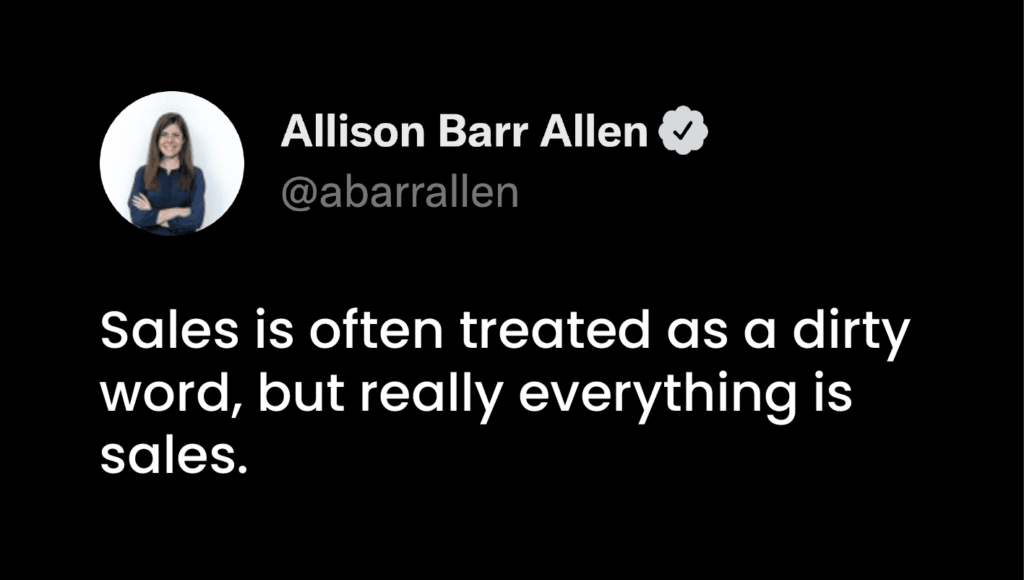Table of Contents

Whether you’ve convinced your friend to go on a jog, persuaded a classmate to help you study, or talked your boss into using a new software, you’re already “selling” on a regular basis without even realizing it.
The question is: Have you ever thought about applying those everyday persuasion skills to a career in sales?
Selling can be interesting, challenging, and rewarding—but what is it really like to work in sales? And how do you know if it’s a good match for you? I’ll walk you through those questions and more, plus offer some tips for getting started in sales.
How to know if working in sales is right for you

Let’s not sugarcoat it—sales isn’t a fit for everyone. Here are a few signs that working in sales might be right for you:
You work well with all kinds of people
Do you like meeting new people and hearing their stories? Working in sales gives you the opportunity to interact with all kinds of people and build strong connections. In every call or presentation you make, it’s important that you can communicate well and establish trust with customers. Building relationships creates a loyal customer base and lays the foundation for future success.
You can handle rejection and overcome objections
Be warned—not every customer is friendly, and not everyone will want to buy from you. In order to be successful in sales, you must maintain composure and confidence, even when someone says no. Even more, you’ll need to overcome any objections and answer questions in a way that convinces customers that your product or service is worth the investment.
You can manage fluctuating income
Sales can be unpredictable, and your income will fluctuate from month to month. Even if you’re great at your job, you’ll have weeks where people don’t want to buy. Some weeks nobody will answer their phones. And sometimes you won’t even get a chance to pitch your product. If your job is commission-based, your income could vary one week to the next, so you’ll need to get good at managing your personal finances.
My last job had a guaranteed base salary, but I could also earn bonuses depending on my performance for the week. I had to determine if I could live off of the base salary alone and what I would do if I didn’t make any commission. Sales requires taking a little risk and understanding that fluctuating income is out of your control at times.
You enjoy competition
Sales is a competitive industry. Not only are you competing against other companies’ products and services, but you’re also competing against other sales representatives within your own company. Embracing healthy competition can be a great motivator to set goals and push you forward. If you’re naturally competitive and ambitious, working in sales is a great way to channel that drive and reach your full potential.
Related:
The skills you’ll need to work in sales

There are a lot of different paths you can take in sales. You could be a door-to-door salesman, work your way up the corporate ladder, or become a self-employed salesperson. You could even become a sales trainer or manager.
But no matter what path you choose, there are a couple skills that you’ll need to succeed in sales:
People skills are essential for building customer relationships
You’ll need to be confident, personable, and persuasive, without being pushy or high-pressure.
Think of a career in sales like dating. You have to put yourself out there, and in doing so, you accept the risk of rejection. But with persistence and mastering the art of influence, you’ll get better at overcoming objections over time.
Related:
Knowledge about your product or service is key
When I first started working in sales, I didn’t know much about the product I was selling. My managers asked me to transfer the call when I didn’t know the answer to a customer’s question. It was extremely nerve-racking. I was constantly hoping customers wouldn’t ask me anything I didn’t know. The last thing I wanted to do was frustrate people and lose sales because I couldn’t answer simple questions—talk about unprofessional.
So, whether you’re selling houses or insurance policies, cars or cosmetics, it’s important to be an expert on the subject. You want to be a reliable source for customers and make sure their questions are answered. The more information you can provide, the easier it will be for them to make a decision. Plus, over time, you’ll build trust and loyalty with your customers.
By no means are these the only skills you’ll need to work in sales, but they are at the core of many different sales jobs. Master them early on and develop other relevant skills as you go.
The pros and cons of working in sales

As with many careers, there are pros and cons to working in sales. Before you start selling, determine if the benefits outweigh the drawbacks based on your personal goals and interests.
The pros
There are multiple benefits to working in sales if you’re up for the challenge:
- Meeting new people and building relationships. Everyday brings new opportunities to connect with others, whether it be potential customers or fellow colleagues.
- Traveling to new places. Depending on the sales job, you could have opportunities to travel for work or earn fun vacations.
- Setting and achieving personal goals. Sales isn’t just a job. It’s a great way to learn new skills and achieve personal goals.
- High income potential. With base pay and opportunities for commission, you can make decent money working in sales. And you can earn more as you improve your selling skills.
- Helping others achieve their goals. If you decide to pursue sales management, you’ll be able to inspire and educate a sales team to develop and reach their own goals, leaving a lasting impact on the people you work with. (And even if you don’t pursue management, you can still be an encouragement to your fellow sales reps.)
The cons
While a career in sales can be highly rewarding, it can be a tough gig. You’re constantly on the go, meeting new people, and trying to close the deal. And you won’t always succeed. Maybe the product wasn’t a good fit for the customer, or maybe they were just having a bad day. Whatever the reason, it can be frustrating when you walk away empty-handed.
Here are some drawbacks of working in sales:
- It’s not a typical 9-5 job. If you want to be successful in sales, you have to be willing to put in the extra hours. There’s not necessarily a set work schedule. If you’re not in the office, you’re out meeting clients or attending networking events.
- Dealing with rejection. No matter how great your sales pitch is, there will always be people who say no. And you have to learn not to take it personally.
- It can be stressful. Sales is a high-pressure job, and you often have to work with challenging customers or meet tight deadlines.
- Varying income. As mentioned previously, working in sales can be risky since you aren’t guaranteed to bring home the same earnings each month. Make sure you’re comfortable with the base pay and have savings tucked away should you need it.
- Staying motivated and disciplined. It can get discouraging when you aren’t making as many sales as usual. You may not always feel motivated. A career in sales requires discipline to keep showing up and putting in the effort. View each day as an opportunity to learn and grow.
Steps for pursuing a sales career

In addition to people skills and product knowledge, there are a few things you should do to set yourself up for success.
Research different types of sales jobs
There are lots of sales jobs out there, so it’s important to find one that’s the best fit for you.
I used to work in sales making cold calls. Calling a stranger was definitely intimidating at times, but to me, it was 100% better than knocking on a stranger’s door. I once shadowed our sales field team and realized quickly that face-to-face sales wasn’t for me. You know yourself better than anyone else, so make sure you ask yourself the right questions and understand the position requirements before accepting a sales job.
Build your sales experience
Many companies require that their salespeople have at least a few years of experience…which is easier said than done when you’re just starting out.
Consider getting an entry-level job in customer service or another related field. This will give you the chance to hone your communication skills and learn more about sales. If you can’t land an internship or entry-level job in sales, there are other ways to get practice.
Start selling on Craigslist or eBay, try working in retail, or gain experience with a direct sales company. Look for opportunities that offer more than just financial incentives. Companies that invest in their employees, provide mentorship, and high quality training are invaluable to your long-term success. The more experience you have, the better prepared you’ll be when it comes time to start pursuing a sales career in earnest.
Only you can decide if sales is right for you
It all depends on your skills, interests, and personality. If you’re driven, persuasive, and good with people, sales could be a rewarding career choice.
And if you venture down the sales path and decide it’s not a fit? No problem.
In fact, you’ll be further ahead for giving it a shot. Whatever your job, the real-world skills you develop in sales are transferable and in demand. Making genuine connections, persuading colleagues and clients, and speaking as an authority on a topic—these skills are relevant to any career.
Still on the fence? I’ll leave you with the words of Seth Godin:
If it scares you, it might be a good thing to try.









